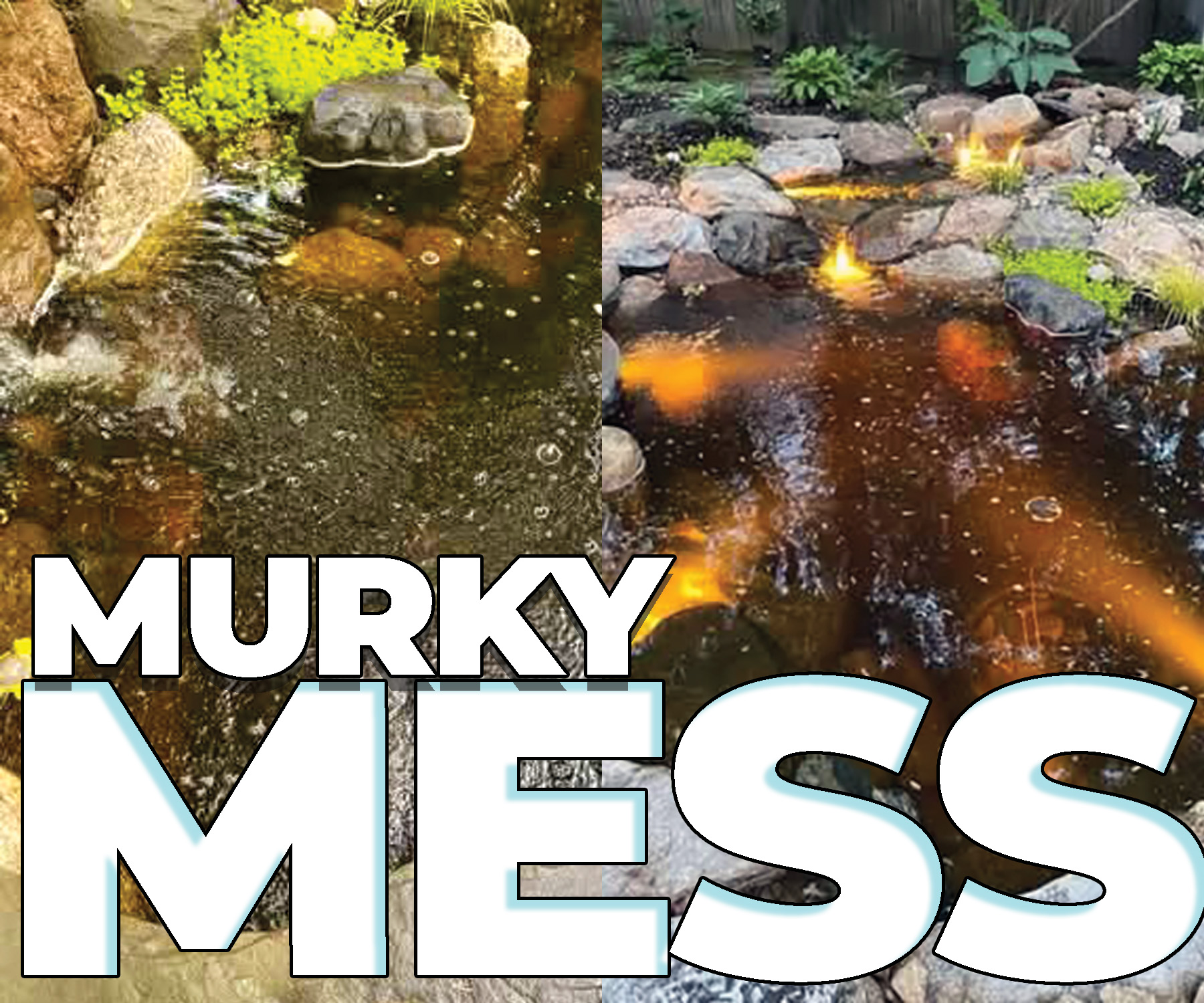😬 Why is my New Jersey pond turning brown? 3 proven fixes ✅
Spring in New Jersey means blooming flowers, greener lawns—and for many homeowners, murky pond water. If your New Jersey pond is turning brown, don’t worry. It’s a common seasonal problem, and the fixes are simple once you know what’s behind it.
Let’s explore the top 3 causes of brown pond water and how to fix them—while protecting the health of your ecosystem. 🌿
🍂 1. Tree pollen stains the water
In early spring, pollen falls like dust from trees and settles on the surface of your pond. It eventually sinks and gives the water a dingy, brownish tint. While not harmful, it’s unsightly and can build up if not filtered out.
🧽 Quick fix: Add a fine filter pad to your skimmer or an area with strong circulation. It’ll trap the tiny particles that cloud your water and improve clarity quickly.
🌧️ 2. Runoff is disrupting your pond’s ecosystem
The real issue for most brown-water ponds? Stormwater runoff.
After heavy spring rains, water flows across lawns, mulch beds, and driveways—picking up:
-
Fertilizers
-
Mulch
-
Soil
-
Pesticides and other chemicals
If your yard slopes toward your pond, that contaminated water runs straight in, turning your pond cloudy and setting off a chain reaction that damages your entire aquatic ecosystem.
🐟 Here’s what runoff actually does to your pond:
💥 1. Nutrient Overload = Algae Blooms
Fertilizer-rich runoff adds nitrogen and phosphorus to your water. These feed algae, which quickly multiply. When algae dies and decays, it clouds the water and fuels more decay.
🐠 2. Oxygen Depletion = Fish Stress
As organic matter like mulch and algae break down, oxygen levels in the water drop. Fish may become sluggish, gasp at the surface, or suffer from disease due to low oxygen.
🧪 3. Chemical Contamination
Runoff can contain herbicides, pesticides, road salts, and even motor oil. These toxins are especially dangerous to koi and goldfish, as well as beneficial bacteria and aquatic insects.
🦠 4. Bacterial Imbalance
Runoff upsets the pond’s microbial balance, reducing beneficial bacteria that naturally break down waste. This can lead to sludge buildup, foul odors, and even more murky water.
💡 Fix it fast:
-
Do partial water changes (10–20% at a time if fish are present)
-
Install a gravel or native plant buffer around the pond to filter runoff
-
Avoid fertilizing within 10 feet of your pond
-
Add beneficial bacteria after rain events to rebalance the ecosystem
For more strategies, check out our eco-friendly pond landscaping learning hub for New Jersey.
🏞️ 3. Poor grading = chronic runoff issues
If your New Jersey pond keeps turning brown year after year, the issue may be landscape grading. If your property funnels water toward your pond, it will continue to flood it with runoff every time it rains.
🛠️ Long-term solution:
-
Regrade land to slope away from the pond
-
Install dry creek beds or swales to redirect flow
-
Use pond-edge plantings like sedges or iris to absorb excess water
❓FAQ: Brown Pond Water in New Jersey Cities
Why is my pond in Short Hills turning brown every spring?
It’s likely a combination of pollen and runoff. Many homes in Essex County have mature landscaping that contributes to spring debris.
How can I stop my Livingston koi pond from turning brown?
Upgrade your filter pads, perform small water changes, and install a natural runoff barrier like native plants or a dry creek bed.
What causes murky pond water in Morristown or Randolph?
Fertilizer runoff and poor drainage are common issues in Morris County, especially after spring landscaping.
Is brown water dangerous to fish in my New Jersey pond?
Yes—especially if runoff brings in chemicals or causes low oxygen. Monitor fish behavior and act quickly with partial water changes and aeration.
Can I prevent my pond from turning brown next year?
Absolutely. Landscape adjustments and filtration upgrades this season will keep your pond clean next spring—and long after.
🎯 Get your New Jersey pond clean and balanced again
A New Jersey pond turning brown in spring is a clear signal that your ecosystem needs help. Whether it’s pollen, fertilizer runoff, or poor grading, you can clear your water and restore health to your pond with a few simple changes.
👉 Want expert help? Contact us today for professional pond solutions in Essex County, Livingston, Morristown, Short Hills, and beyond. We’ll help you protect your fish, clean your water, and keep your pond beautiful year-round.
Looking for more great tips, tricks and quality content? Check out our YouTube Channel!🌳 What can I do to clear my pond water fast in Morris County?
If you live in Morris County and want fast results, a UV filter, a dosing system, and aggressive plant coverage will help clear your pond naturally—often within a week or two. Be sure to skim surface pollen regularly in peak season.
👉 See how we help with pond maintenance in Morris County
🌼 Do I need different plants for a pond in Hunterdon County?
Not necessarily—but choosing hardy varieties like hornwort, cattails, and water lettuce can give you the upper hand. In rural areas of Hunterdon County, where pollen and runoff are more intense, aquatic plants play a major role in keeping the ecosystem balanced.
